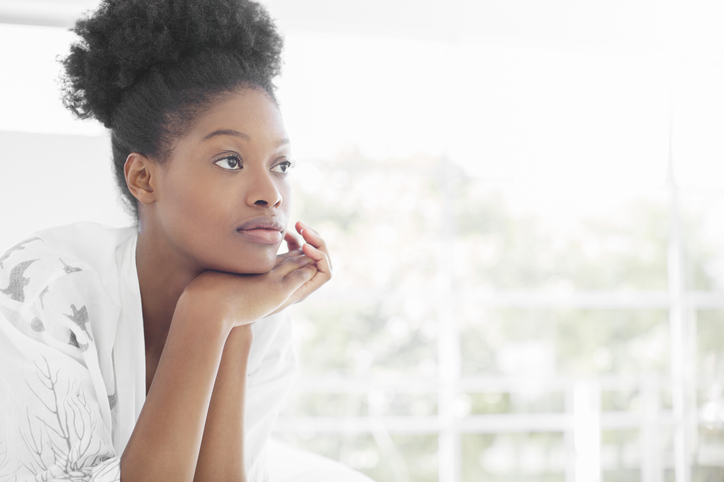
Source: David Lees / Getty
It’s the weekend of Valentine’s Day. Some people are trying to figure out a way to have a romantic Valentine’s Day with a special someone in the midst of the pandemic. Others are planning to enjoy an extended holiday weekend and happily binge-watch their favorite programs solo. And then there are those who are approaching the holiday with a sense of sadness. It’s not necessarily because they don’t have a valentine, but rather, because they haven’t been able to make new connections with possible romantic interests, or even get to be around family and friends whom they love most due to COVID-19. So the day of love that Valentine’s Day is supposed to be can instead become a tough reminder of how alone one might feel during these tumultuous times.
The best remedy for that as we approach the holiday is to make sure you’re loving on yourself.
“Taking time to pour into your own cup of wellness is an essential part of maintaining your wellness,” says Danielle Jackson, MD MPH. Dr. Jackson is fourth-year resident physician in the department of psychiatry at Yale University. She says that while talking about self-care is more common these days, many Black women aren’t actively practicing it the way they need to because “we have been told for generations that everything and everyone comes before our own wellbeing.” She says bubble baths and face masks are nice, but you can tend to yourself in deeper ways that can make a significant difference in how you ultimately feel.
“We can nourish our bodies in a number of ways and still remain connected with family and friends during this time. Prepare a meal with a loved one over a video chat,” recommends Dr. Jackson. Do something to get your body moving, indoors or outdoors. One thing we have seen during this time is the creative ways that people are staying physically active, from YouTube dance workouts to virtual yoga classes. While these things will never replace physical connection, it’s one tool to address loneliness that folks who are isolated from family and friends may be feeling.”
She also encourages us to keep our minds sharp.
“It’s also good to do things that actively stimulate our brain: puzzle books, take a free online class, enjoy a new book you’ve had on that reading list for a while.”
In addition to that, it’s important when you’re feeling mentally low to practice gratitude. Dr. Jackson says doing so every morning that you wake up can provide the boost you need.
“Try setting aside five minutes every morning and write down three things you are grateful for. The answers don’t need to be complicated. Simply waking up can be one of them.” she says. “The key is that this practice allows you to appreciate the everyday we may take for granted from time to time.”
And one thing to be very grateful for despite the damper quarantine can have on one’s mental wellbeing is the blessing of good health and life overall. Watching so many fall ill and more than 480,000 dying in the U.S. should put things in perspective and make us all want to stay safe and healthy. But there are those who have gone back to pretending things are fine due to an immense desire to interact with others. That’s why the number of travelers increased dramatically at the end of 2020 during the holiday season.
“That desire for connection, to hug a loved one, to share a meal with friends you haven’t seen since the pandemic is a part of being human,” she says. “Continue to stay connected with family and friends by telephone, video, text chats. This may not seem like much, but maintaining a healthy social connection helps to protect against depression.”
Something Dr. Jackson is specifically grateful that has come about during the pandemic is that more conversations are being had about mental health and how to better care for your own.
“This has been a difficult time and for those who already suffered from mental health conditions like depression or anxiety it likely has been a little more challenging,” she says. “One good thing is as a community we are talking about mental health more and more. I would encourage anyone concerned about their mental health or that of a family member or friend to talk about it.”
And Dr. Jackson provided great resources, recommending the Black Emotional and Mental Health Collective (or BEAM), which provides “education and toolkits to learn more about mental health, journaling prompts and daily affirmations.” There’s also the non-profit Depressed While Black to help you find therapists in your community, Therapy for Black Girls, a mental health and wellness site and podcast, and Health in Her Hue to help Black women to gain access to “competent” healthcare providers of all types in addition to mental health.
Valentine’s Day can be a painful reminder of the things and people missed around this time. However, prioritizing the health of one’s self in mind, body, and spirit can help you to keep focused on the bigger picture with this holiday season, and more importantly, when trying to get through the day to day.


